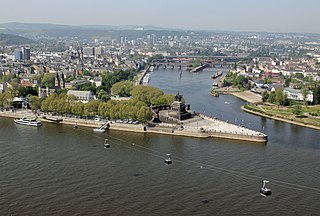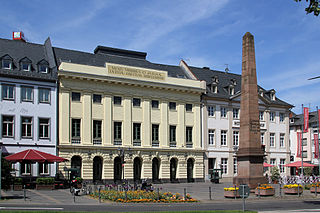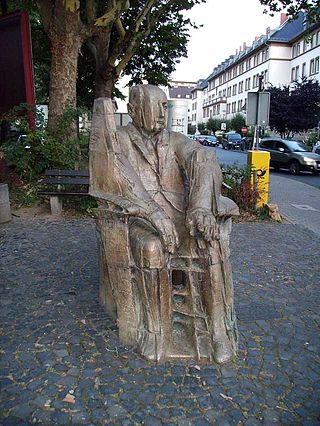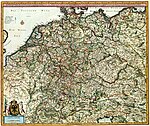
The Moselle is a river that rises in the Vosges mountains and flows through north-eastern France and Luxembourg to western Germany. It is a left bank tributary of the Rhine, which it joins at Koblenz. A small part of Belgium is in its basin as it includes the Sauer and the Our.

Koblenz is a German city on the banks of the Rhine and the Moselle, a multinational tributary.

Boppard Hauptbahnhof is a station in the town of Boppard in the German state of Rhineland-Palatinate. It is located on the outskirts of the town near the Rhine. It is at a railway junction on the West Rhine Railway between Köln Hauptbahnhof and Mainz Hauptbahnhof, and it is the starting point of the Hunsrück Railway (Hunsrückbahn) to Emmelshausen. It has three platform tracks.

Koblenz Hauptbahnhof is a railway station in the city of Koblenz in the German state of Rhineland-Palatinate. It is the focal point of rail transport in the Rhine-Moselle-Lahn area. It is a through station in southern Koblenz built below Fort Großfürst Konstantin and opened in 1902 in the Neustadt, which was built after the demolition of the city walls in 1890. The station replaced two former stations on the Left Rhine railway, which were only 900 m (3,000 ft) apart, and the former Moselle line station. Koblenz-Stadtmitte station opened in April 2011 in the old centre of Koblenz. Koblenz Hauptbahnhof is on the West Rhine Railway and connects to the Moselle line, the East Rhine Railway and to the Lahntal railway. It is used daily by about 40,000 travelers and visitors. In the station forecourt are a bus station and a pavilion.

The Electoral Palace in Koblenz, was the residence of the last Archbishop and Elector of Trier, Clemens Wenceslaus of Saxony, who commissioned the building in the late 18th century. In the mid-19th century, the Prussian Crown Prince had his official residence there during his years as military governor of the Rhine Province and the Province of Westphalia. It now houses various offices of the federal government.

Koblenz-Ehrenbreitstein station is the only station on the right (eastern) bank in the city of Koblenz in the German state of Rhineland-Palatinate. It is on the East Rhine railway at the foot of the Ehrenbreitstein hill in the Ehrenbreitstein district, next to the Rhine.
The following is a timeline of the history of the city of Bonn, North Rhine-Westphalia, Germany.

The following is a timeline of the history of the city of Aachen, Germany.
The following is a timeline of the history of the city of Mainz, Germany.
The following is a timeline of the history of the city of Münster, North Rhine-Westphalia, Germany.

The following is a timeline of the history of the city of Dortmund, Germany.
The following is a timeline of the history of the city of Duisburg, Germany.

The Old Castle was a former Elector-owned, substantial water castle in the German city of Koblenz, incepted in the 13th century. It is today reduced to the later Burghaus ; which houses the city archives. It sits on tall foundations and has a tall, black slate roof with further floors in the attic and two small cupolas. The lowland castle abutted the remaining building in the old town quarter. The castle house stands tall, next to the Moselle's right-bank towpath downstream of the strategic Baldwin Bridge built in 1342. The bridge, much-repaired, remains intact.
The following is a timeline of the history of the city of Mannheim, Germany.
The following is a timeline of the history of the city of Kassel, Germany.
The following is a timeline of the history of the city of Erfurt, Germany.
The following is a timeline of the history of the city of Halle an der Saale, Germany.
The following is a timeline of the history of the city of Linz, Austria.

The Theater Koblenz is a multi-arts theatre with its own ensembles for drama, music theatre, puppetry and ballet located in Koblenz, Germany. It has about 190 permanent employees from 22 nations and offers 500 seats in a theatre building from the 18th century not far from the Electoral Palace. The manager until the end of the 2024/2025 season is Markus Dietze. Venues include the Theater am Deinhardplatz, rehearsal stages 2 and 4 as well as the Festung Ehrenbreitstein for the summer performances. In addition, the theatre participated in the Koblenz Fortress Plays for several years. In the 2009/2010 season, it was renamed from Theater der Stadt Koblenz to its current name.

Fritz Michel was a German physician, politician, historian and art historian.











